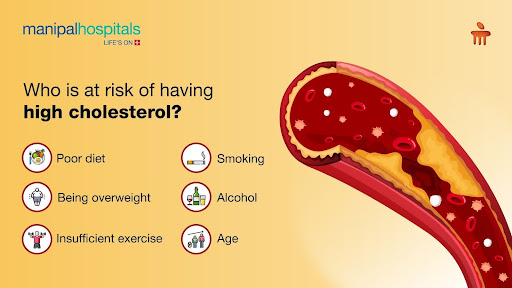Are you feeling a little overweight lately? Do you feel tired even after making small physical efforts? Do you sweat profusely often? Has your vision started being blurry these days? One justification for this pile of questions could be a heart attack.
An analysis of population-based research conducted in India reveals rising mean total cholesterol. According to recent studies, 25–30% of urban and 15-20% of rural people have elevated cholesterol. Therefore, understanding the health risks of cholesterol can prevent severe complications. This blog post briefly describes the possible link between cholesterol and heart attack.
Synopsis
What is Cholesterol?
Cholesterol is a waxy, fat-like material that your body uses to manufacture many hormones, vitamin D, and cell membranes. When these deposits accumulate over time, your arteries can no longer adequately pump blood. Occasionally, such deposits may rupture abruptly, forming a clot that results in a stroke, heart attack, or congestive heart failure.
Who is at Risk for High Cholesterol?

The following variables may raise your risk of having adverse effects of high cholesterol:
-
Poor diet: Unhealthy cholesterol levels can arise from consuming excessive trans or saturated fats. Full-fat dairy products and fatty meat cuts contain saturated fats. Packaged snacks and desserts are common sources of trans fats.
-
Being overweight: You run the risk of having high cholesterol if your body mass index (BMI) is 30 or above.
-
Insufficient exercise: Exercise raises your body's "good," or HDL, cholesterol levels.
-
Smoking: Smoking cigarettes may reduce your HDL, or "good," cholesterol levels.
-
Alcohol: Excessive alcohol consumption can raise overall cholesterol.
-
Age: Unhealthy cholesterol can occur in even young children, although it is far more common in those over 40. As you get older, your liver’s capacity to eliminate LDL cholesterol reduces.
Understanding the Association Between High Cholesterol and Heart Attack
Many people are familiar with two types of cholesterol: high-density lipoprotein (HDL, or good cholesterol) and low-density lipoprotein (LDL, or bad cholesterol). Cholesterol travels through our bloodstream, and too much of it can build up on artery walls, causing a condition called atherosclerosis—a type of heart disease where arteries narrow and can slow down or block blood flow to the heart muscle. This reduced blood flow can cause chest discomfort, and in more serious cases, it can lead to a heart attack or stroke if blood flow to the heart or brain is completely cut off.
Symptoms of High Cholesterol
High cholesterol does not cause symptoms. However, some of the symptoms that develop due to complications of cholesterol are
-
left-sided chest pain
-
pressure, or fullness
-
dizziness
-
an unsteady gait
-
slurred speech
-
pain in the lower legs
If these symptoms persist, book an appointment with our best Cardiologist in Mukundapur.
What is the Treatment for High Cholesterol?
-
The most often prescribed drug for high cholesterol is statin.
-
Statins lessen the quantity of cholesterol your liver produces.
-
Medications may reduce your risk of strokes and heart attacks.
-
Statins include atorvastatin, rosuvastatin calcium, fluvastatin (Lescol), etc.
How to Prevent Cholesterol?
-
Consume a diet high in soluble fibre and omega-3 fats and low in saturated fats for heart health. Reduce your intake of sugar, full-fat dairy products, and red meat. Avoid trans fats at all costs.
-
Five days a week, engage in moderate exercise for at least 30 minutes.
-
Don't vape or smoke. Give up smoking.
-
Quit alcohol.
-
Lose weight if you need to. Even a 10% body weight loss can improve your cholesterol.
Conclusion
People with high cholesterol are more prone to heart attacks and other heart-related complications. Because of this, it's critical to have your cholesterol evaluated, particularly if heart disease runs in your family. Reducing your LDL “bad cholesterol” through a good diet, exercise, and medicine can have a positive impact on your overall health. Consult with our Cardiology Hospitals in Mukundapur to ensure the best care for your heart.
FAQ's
With high cholesterol, you can develop fatty deposits in your blood vessels. These deposits eventually enlarge, obstructing your arteries' ability to carry adequate blood. These deposits can occasionally rupture and produce a clot that results in a heart attack or stroke.
Although it is not the primary cause of increased cholesterol, stress causes high cholesterol. According to one study, higher levels of stress were associated with an increased risk of elevated cholesterol among those who felt pressure from their jobs or personal relationships.
'Good' cholesterol is defined as high-density lipoprotein, or HDL cholesterol. Low-density lipoprotein, or 'bad' cholesterol, is removed from your blood by HDL, preventing it from accumulating in your arteries. Because LDL cholesterol causes plaque to form and accumulate on the artery walls, it is sometimes referred to as bad cholesterol.
Physicians advise keeping your total cholesterol level below 200 mg/dL.
With proper precautions, lifestyle modifications, and medical treatment, high cholesterol can be managed.





















 4 Min Read
4 Min Read



















